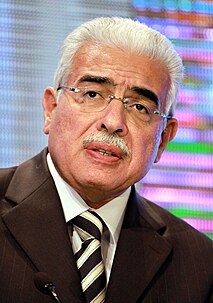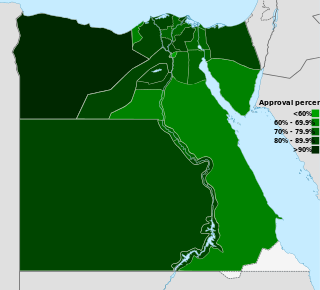
The politics of Egypt is based on republicanism, with a semi-presidential system of government, established following the Egyptian Revolution of 2011, and the resignation of President Hosni Mubarak. The President of Egypt is elected for a maximum of two four-year terms and the Parliament is unicameral and unbiased. The President can appoint up to 5% of the total number of seats in Parliament, and can also dissolve it. Parliament can also impeach the President. Egypt was traditionally ruled by royals until 1952, but the first free elected President was in 2006. The Parliament of Egypt is the oldest legislative chamber in Africa and the Middle East.

Elections in Benin take place within the framework of a multi-party democracy and a presidential system. Both the President and the National Assembly are directly elected by voters, with elections organised by the Autonomous National Electoral Commission (CENA).

Elections in Egypt are held for the President and a unicameral legislature. The President of Egypt is elected for a four-year term by popular vote.

Parliamentary elections were held in Kyrgyzstan on 27 February and 13 March 2005. The belief that the elections had been rigged by the government led to widespread protests, culminating in the Tulip Revolution on 24 March in which President Askar Akayev was overthrown.

The Egyptian presidential election of 2005, held on September 7, 2005, was the first allegedly contested presidential election in Egypt's history. Hosni Mubarak, the former President of Egypt, won a fifth consecutive six-year term in office, with official results showing he won 88.6% of the vote. Mubarak's opponent, Ayman Nour, of the Tomorrow Party, is estimated to have received 7.3% of the vote and Numan Gumaa received 2.8%, however, Nour claimed that prior polling results showed over 30%. Criticism of the election process has centred on the process of selecting the eligible candidates, and on alleged election-law violations during voting. Mubarak was sworn in for his new term on September 27.

The Egyptian parliamentary elections of 2005 was the scheduled three-stage elections in November and December 2005 for determining its lower house membership. The elections formed the Eighth Assembly since the adoption of the 1971 Constitution. Over 7,000 candidates competed in 222 constituencies for the Assembly's 444 elected seats.

The 2005 Egyptian constitutional referendum took place in Egypt on 25 May 2005. The referendum was on a proposed change to the constitution of Egypt which would establish direct elections for the presidency. The opposition parties called for a boycott of the vote, which was passed by a large majority.

A presidential election was held in Egypt in two rounds, the first on 23 and 24 May 2012 and the second on 16 and 17 June. The Muslim Brotherhood declared early 18 June 2012, that its candidate, Mohamed Morsi, won Egypt's presidential election, which would be the first victory of an Islamist as head of state in the Arab world. It was the second presidential election in Egypt's history with more than one candidate, following the 2005 election, and the first presidential election after the 2011 Egyptian revolution which ousted president Hosni Mubarak, during the Arab Spring. Morsi, however, lasted little over a year before he was ousted in a military coup in July 2013.

The Egyptian parliamentary elections of 2010 first voting round was held in Egypt on 28 November 2010 and the second round was held on 5 December 2010.
Parliamentary elections were held in Egypt on 27 May 1984. Since the last election in 1979, changes had been made to the electoral system. The 176 two-member constituencies were replaced by 48 multi-member constituencies, with candidates elected on a party list system, with a party needing over 8% of the vote to win a seat.

A parliamentary election to the People's Assembly of Egypt was held from 28 November 2011 to 11 January 2012, following the revolution that ousted President Hosni Mubarak, after which the Supreme Council of the Armed Forces (SCAF) dissolved the parliament of Egypt. However the dissolution was ruled unconstitutional and Parliament was reinstated. Originally, the elections had been scheduled to be held in September 2011, but was postponed amid concerns that established parties would gain undue advantage.

A constitutional referendum was held in Egypt on 19 March 2011, following the 2011 Egyptian revolution. More than 14 million (77%) were in favour, while around 4 million (23%) opposed the changes; 41% of 45 million eligible voters turned out to vote.

The Egyptian Bloc was an electoral alliance in Egypt. It was formed in August 2011 by several liberal, social democratic, and leftist political parties and movements, as well as the traditional Islamist Sufi Liberation Party to prevent the Muslim Brotherhood, and its affiliated Freedom and Justice Party from winning the parliamentary election in November of that year. As of September 2012, all former constituent parties left the bloc, joined other alliances or merged into other parties.
The Freedom Party is an Egyptian political party. It was founded on 17 July 2011. The party consists of remnants of the formerly dominant National Democratic Party, which was dissolved following the 2011 Egyptian revolution. The party's chairman is Mamdouh Hassan, its secretary general was his brother Moatz Hassan.
Following the 2011 Egyptian revolution, the Muslim Brotherhood in Egypt became one of the main forces contending for political power in Egypt against the Supreme Council of the Armed Forces (SCAF) and other established centers of the former Hosni Mubarak regime.

Egyptian parliamentary elections to the House of Representatives were held in two phases, from 17 October to 2 December 2015. The elected parliament will be entrusted with the task of reviewing the laws that were passed while a parliament was not in session.

A constitutional referendum was held in Egypt in two rounds on 15 and 22 December 2012. Egyptians living abroad were scheduled to vote between 8 and 11 December. Voting for expatriates had been delayed until 12 December 2012 and was extended until 17 December 2012. Voters were asked whether they approve of the draft constitution that was approved by the Constituent Assembly on 30 November 2012.

A presidential election in Egypt took place between 26 and 28 May 2014. There were only two candidates, former Egyptian defence minister Abdel Fattah el-Sisi and Egyptian Popular Current candidate Hamdeen Sabahi. According to the Egyptian government, Sisi was elected with 97% of the vote.

General elections for the Consultative Assembly were held in Oman on 25 October 2015.

















